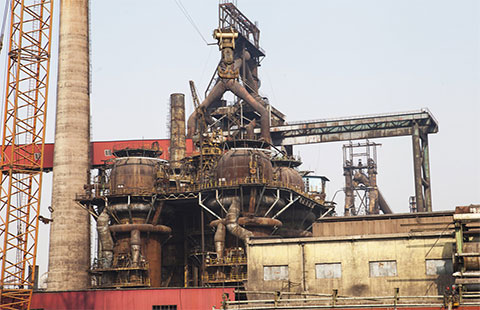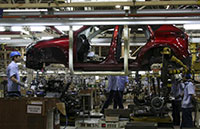

The European economy is forecast to begin recovering later this year and gather speed in 2013, European Commission officials in Brussels said on Friday. The forecast comes nearly two years after Europe's debt turmoil started and four years after its financial crisis began.
The European economy remains "extraordinarily fragile" because the risk of a renewed aggravation of the crisis is still present, officials said.
Politicians and analysts agreed that the European Union and its common currency were being challenged like never before, especially against the backdrop of elections in France and Greece.
On Friday, Brussels said that real GDP this year was projected to stagnate in the EU and to contract by 0.3 percent in the eurozone. For 2013, growth is forecast at 1.3 percent in the EU and 1.0 percent in the eurozone.
Unemployment is expected to remain high in 2012, at 10 percent in the EU and 11 percent in the euro area. Inflation is set to moderate gradually as the impact of higher oil prices and tax increases fades away.
Fiscal consolidation is forecast to progress, with public deficits in 2013 declining to 3.3 percent in the EU and just below 3 percent in the eurozone. It also said that the economic situation differs considerably across member states, in view of the ongoing adjustment to the large disparities in external positions and structural conditions that have come to the fore over the last few years.
Brussels said that Poland is set to register the highest economic growth in the EU in 2012, despite a moderate slowdown, and will maintain the pace in 2013.
Olli Rehn, European Commission vice-president for economic and monetary affairs and the euro, said: "A recovery is in sight, but the economic situation remains fragile, with large disparities across member states."
Rehn also said the EU is witnessing an ongoing adjustment of the fiscal and structural imbalances built up before and after the onset of the crisis, made worse by still weak economic sentiment. Without further determined action, however, "low growth in the EU could remain," he said.
Rehn said sound public finances are the condition for lasting growth, and building on the new strong framework for economic governance, Brussels must support the adjustment by accelerating stability and growth-enhancing policies.
The London-based consultancy company, Exclusive Analysis, said the current elections in France and Greece may have an impact on Europe's economic situation.
Exclusive Analysis said French President-elect Francois Hollande is likely to focus on domestic policy until after the parliamentary elections in June. Eurozone policy and the relationship with German Chancellor Angela Merkel are not likely to be his priorities until after then, given the political sensitivity of the austerity debate.
"But he will have to intervene, at least orally, as Greece's political crisis affects its bailout program in June. This is likely to make for a tense Franco-German relationship for the next three months," the company's latest report said.
The company also said that in Greece, another round of elections is likely. One scenario is that New Democracy and PASOK will be able to get a thin majority in June, if they frame the vote as a referendum on Greece staying in the euro. But this does not remove the fact that they will still find it politically difficult to implement deeper cuts in their austerity plans as requested by the International Monetary Fund and the EU.
The latest developments in Europe have triggered debates among politicians on Europe's future. The European Parliament debated the achievements and the challenges facing the EU in the midst of the current crisis on Wednesday.
On that day in 1950, French minister Robert Schuman made a historic declaration that paved the way for the EU.
In the debate, led by European Parliament President Martin Schulz called for courage in the face of the crisis and reminded everyone that Europe was built in "a quiet revolution" in the aftermath of a war between its nations.
"Yet why is the current crisis, like a centrifugal force, driving us apart rather than binding us more closely together?" he asked. He warned that the euro was in danger of becoming "a symbol of national egotisms or even division".
Schulz said that if budget discipline is essential, so is growth: "Only together can we act to prevent the economic decline of Europe and halt unemployment."
Joseph Daul, French leader of the Christian-Democrat group, emphasized that reducing debt and stimulating growth should not be considered separately. He added that investments in growth could not be made by increasing expenditure. Instead, he said, the EU should aim to achieve growth by making its economies more competitive.
"This can be done through completing the single market, investing in research and development, reducing red tape and freeing up small and medium-sized enterprises," said Daul.
Hannes Swoboda, the Austrian leader of the Social-Democrat group, said there was a need to think about the construction and reconstruction of Europe: "The austerity budget is undermining public investment, instead of creating growth and jobs, especially for young people who are the victims of mass unemployment," said Swoboda.
fujing@chinadaily.com.cn
 New wind power group sprouts up in Chongqing
New wind power group sprouts up in Chongqing
 Top 5 online rumors of latest iPhone
Top 5 online rumors of latest iPhone
 A glimpse of former Shougang industrial site
A glimpse of former Shougang industrial site
 Robot waiter introduced to restaurant in South China
Robot waiter introduced to restaurant in South China
 Qingdao gets ready for huge beer festival in China
Qingdao gets ready for huge beer festival in China
 Top 9 automobile recalls in H1 in China
Top 9 automobile recalls in H1 in China
 Disabled veteran carves out success on Internet
Disabled veteran carves out success on Internet
 Top 10 regions with highest GDP growth
Top 10 regions with highest GDP growth
 Caixin China manufacturing PMI falls to two-year low
Caixin China manufacturing PMI falls to two-year low
 China official manufacturing PMI falls to 50.0 in July, below forecasts
China official manufacturing PMI falls to 50.0 in July, below forecasts